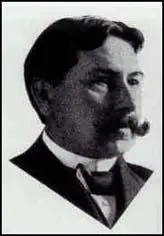Gustav von Kahr

Gustav von Kahr, the son of a senior Bavarian civil servant, was born in 1862. After studying law in Munich he worked as a lawyer in Kaufbeuren. In 1902 Kahr joined the Bavarian State Department where he had responsibility for art and monuments.
Kahr held right-wing, nationalist views and was eventually elected leader of the Bavarian People's Party. In the final stages of the First World War Kahr became head of the provincial government of Upper Bavaria.
During the German Revolution Kahr was ousted from power and Eugen Levine, a member of the German Communist Party (KPD), became the new leader of the Bavarian Republic. Inspired by the events of the October Revolution, Levine ordered the expropriated of luxury flats and gave them to the homeless. Factories were to be run by joint councils of workers and owners and workers' control of industry and plans were made to abolish paper money. Levine, like the Bolsheviks had done in Russia, established Red Guard units to defend the revolution.
In May, 1919, Friedrich Ebert, the Chancellor of Germany, ordered the German Army and the Freikorps into Bavaria. They quickly gained control and over the next few weeks an estimate 700 men and women were captured and executed. Eugen Levine was arrested and after being found guilty of being involved in the execution of the eight spies, was shot by a firing squad.
The following year Kahr became new prime minister of Bavaria. Political violence continued and after the assassination of several political leaders Kahr was appointed general state commissioner in September, 1923. He immediately uses his new powers to ban left-wing newspapers in Bavaria.
Despite Kahr's right-wing nationalist views, Adolf Hitler was unimpressed with his government. On 8th November, 1923, the Bavarian government held a meeting of about 3,000 officials. While Kahr was making a speech, Hitler and armed stormtroopers entering the building. Hitler jumped onto a table, fired two shots in the air and told the audience that the Munich Putsch was taking place and the National Revolution had began.
Leaving Hermann Goering and the Sturm Abteilung (SA) to guard the 3,000 officials, Hitler took Kahr, Otto von Lossow, the commander of the Bavarian Army and Hans von Seisser, the commandant of the Bavarian State Police into an adjoining room. Hitler told the men that he was to be the new leader of Germany and offered them posts in his new government. Aware that this would be an act of high treason, the three men were initially reluctant to agree to this offer. Hitler was furious and threatened to shoot them and then commit suicide: "I have three bullets for you, gentlemen, and one for me!" After this the three men agreed.
While Hitler had been appointing government ministers, Ernst Roehm, leading a group of stormtroopers, had seized the War Ministry and Rudolf Hess was arranging the arrest of Jews and left-wing political leaders in Bavaria.
Hitler now planned to march on Berlin and remove the national government. Surprisingly, Hitler had not arranged for the stormtroopers to take control of the radio stations and the telegraph offices. This meant that the national government in Berlin soon heard about Hitler's putsch and gave orders for it to be crushed.
The next day Adolf Hitler, Eric Ludendorff, Hermann Goering and 3,000 armed supporters of the Nazi Party marched through Munich in an attempt to join up with Roehm's forces at the War Ministry. At Odensplatz they found the road blocked by the Munich police. As they refused to stop, the police fired into the ground in front of the marchers. The stormtroopers returned the fire and during the next few minutes 21 people were killed and another hundred were wounded, included Goering.
Kahr's unwillingness to take part in Hitler's attempt to gain power lost him the support of right-wing nationalist forces in Bavaria and he was forced to resign from office in February, 1924.
After serving as president of the Bavarian administrative court (1924-27), Kahr retired from public life. Adolf Hitler had never forgiven Kahr for his failure to support the Nazis during the Munich Putsch and his name was added to the list of people to be murdered during the Night of the Long Knives. The seventy-one year old Gustav von Kahr was murdered by members of the Schutz Staffeinel (SS) on 30th June, 1934.
